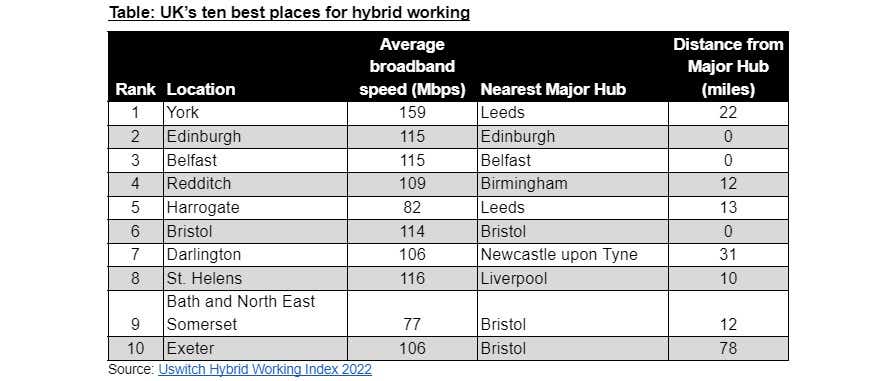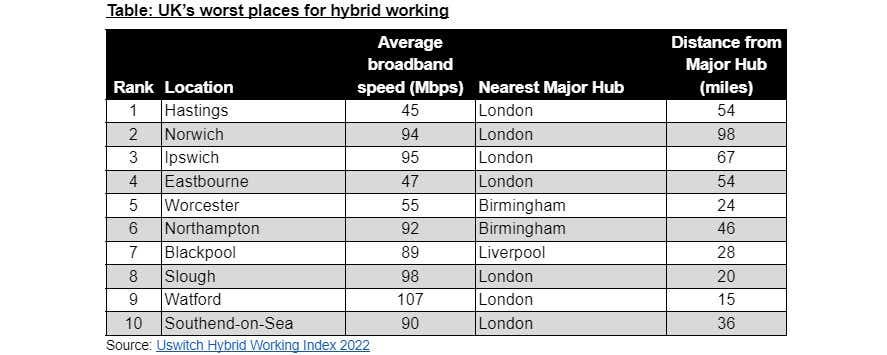York is ranked best place to live in new Uswitch Hybrid Working Index
New index reveals York is the UK’s best place for hybrid working, due to its superfast broadband, good schools, low crime, and closeness to Leeds[1]
Edinburgh and Belfast sit second and third in Uswitch’s Hybrid Working Index[1], which ranks the UK’s biggest towns and cities on eight metrics, including crime rate, green spaces and number of local GPs
With a quarter of workers (24%) planning to divide their time between home and a workplace regularly[2], broadband speed is the most important factor for three in five people (60%) when working from home[3]
One in four Brits (27%) would like to move house to have more flexible working arrangements[4]
Redditch, Harrogate, Bristol, Darlington, St Helens, Bath and Exeter complete the top ten best places to live for hybrid working[1]
Hastings finished last on the list, with fellow seaside destinations Blackpool, Eastbourne and Southend-on-Sea joining it in the bottom ten
Uswitch.com offers advice to homeowners on how to improve their broadband connectivity while working from home.
With the number of Brits dividing their time between home and the workplace doubling since the pandemic[2], York has been named the best place to live in a brand new Hybrid Working Index[1], created by Uswitch.com, the comparison and switching service.
Average broadband speeds of 159Mbps, large areas of green space, low crime rates, and close proximity to work hub Leeds, have seen York crowned as the UK’s ideal hybrid working location[1].
Edinburgh and Belfast come second and third in the Hybrid Working Index[1], which ranks the desirability of more than 100 of the UK’s biggest towns and cities based on broadband speed, green spaces, air quality, crime rates, quality of schools, distance to closest hub city and GPs per 1,000 people.
The top three are followed by Redditch, Harrogate, Bristol, Darlington, St Helens, Bath and North East Somerset, and Exeter[1].

The UK’s biggest cities rank further down in the index, with London 23rd, Birmingham 30th, and Manchester coming 82nd[1]. With so many people making their home in the capital, London scored well on amenities like coffee shops and unsurprisingly had the highest average house price on the index. Yet the Big Smoke fared poorly on its crime figures and low percentage of green space, and was far down the field with an average download speed of 102Mbps.
Despite their enduring appeal to holidaymakers, seaside locations featured well down the list with Hastings, Eastbourne, Blackpool and Southend-on-Sea all in the bottom ten. Backmarker Hastings struggled with a combination of sluggish broadband speeds, a relative lack of GPs and poor air quality, while Norwich’s distance from nearest hub city London, coupled with a low average OFSTED rating for its schools, saw it finish second to last.

Prior to the pandemic, only one in ten people (11%) divided their week between home and work, but this has now doubled (22%), and workers expect this to rise further over the next six months. The proportion of people solely working from their workplace has fallen from three quarters (76%) to just over half (56%) of workers[2].
Brits living in and around London (31%) and Manchester (30%) are most likely to be hybrid workers, while those near Cardiff (10%) are the least likely, following the trend in Wales as a whole (8%). However, six months down the line more than one in four Welsh workers (27%) expect to be splitting their job between their home and office[2].
In Scotland, living near Edinburgh means you are more slightly likely to be a hybrid worker (17%) just ahead of Glasgow (16%), yet over a quarter of those near the capital city (26%) expect they will be doing a mix of remote and office working in half a year’s time[2].
People living in Belfast are also optimistic about an increase in hybrid working, with 22% expecting to split their job between home and their workplace in the future, compared with 15% who currently do[2].
A quarter of people (27%) say they would like to move house to take advantage of hybrid working. When choosing a new place to live, half of people (53%) say house prices are most important, followed by green spaces (45%), crime rates (43%), broadband speeds (34%), air quality (28%), local GP numbers (20%) and the quality of local schools (16%)[5].
For hybrid workers, broadband connectivity is a key ingredient to ensure they can perform their day job at home. More than two thirds of people (68%)[3] rated it as the most important factor when working remotely, while just over a quarter (26%) say a more reliable broadband connection would encourage them to increase the time they spent working from home[4].
Ernest Doku, broadband expert at Uswitch.com, comments: “The last few years have turned our working lives on their head, and many of us have enjoyed the benefits of leaving the commute behind and spending more time at home.
“It’s been an opportunity for many to escape the rat race, move away from the big cities and enjoy life in a more rural setting.
“Our Hybrid Working Index reveals some of the country’s best places to live if you’re alternating between working from home and the office. York comes top thanks to its combination of superfast broadband, huge amount of green spaces, and close proximity to work hub Leeds.
“While some cities like Bristol did score highly enough to make the top 10, London had a patchy performance - despite being home to big businesses and the country's most expensive properties it was let down by a lack of green space and surprisingly modest average broadband speeds.
“If you’re moving to a new area to work remotely, the speed - and reliability - of your broadband connection will be one of the most important things about your new location.
“Do your research and pop your prospective postcode into an online comparison to see what speeds you could get before committing to a move. Once you’ve got the move confirmed, don’t forget to let your existing (and potentially new) broadband provider know, so you’re not caught short when the big day to switch comes.”
Uswitch’s quick tips for improving home broadband connection
Reboot your router — the classic ‘unplug it, leave it 30 seconds and plug it back in’ can sometimes be all you need to kick the router back into action.
Location, location, location — if your router is located further away than it needs to be, try moving it to the room you’re most active in or the centre of your home.
Disconnect unnecessary devices — turn the Wi-Fi off on gadgets you’re not using, even if they’re in a drawer. They may be using bandwidth in the background.
Run a speed test— this will determine whether your router is running at the speeds you signed up for. If it’s not, have a conversation with your provider.
Purchase a Wi-Fi extender or ‘booster’ — this will optimise your broadband for faster and stronger connections in those ‘not spots’ around your home.
Read Uswitch’s guide to broadband and moving home here.
About Uswitch
Uswitch is one of the UK’s top comparison websites for home services switching, including energy, broadband and mobiles.
More people go to Uswitch to switch their energy, broadband and mobile than any other site, and we have saved consumers over £2.7 billion off their bills since we launched in September 2000.
Free mobile app Utrack also helps households manage their home energy usage and make potential savings.
Uswitch is part of RVU, a group of online brands with a mission to empower consumers to make more confident home services, insurance and financial decisions.
